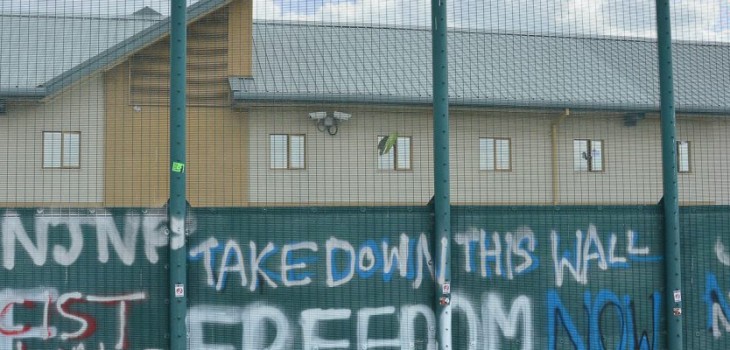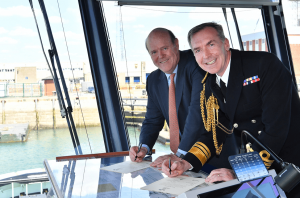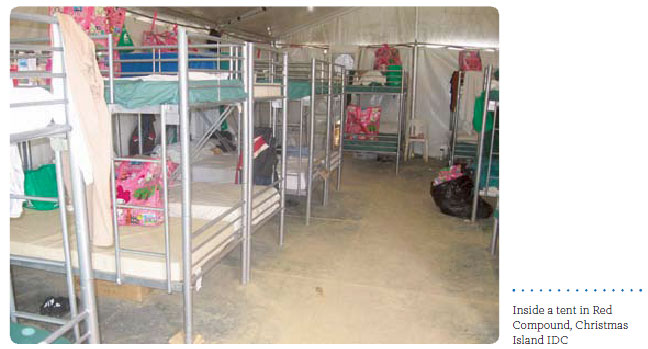Serco: company profile 2018

Serco is an outsourcing company that specialises in public sector work. It runs services in five areas: defence, “justice and immigration”, health, transport, and “citizen services”. It works for 20 governments worldwide, but 40% of all its business remains in the UK, with another 19% in Australia as of 2017.
- One of its biggest contracts is running 11 Australian immigration detention centres. In the UK, it runs Yarl’s Wood detention centre.
- Serco has been hit by numerous scandals, most famously in 2013 when it was exposed along with G4S overcharging the government by millions on its electronic tagging contract.
- Serco was the first of the big-name outsourcers to hit financial trouble recently, with a run of profits warnings starting in 2013. Damage was done by numerous loss-making contracts taken on as the company raced to expand. As a result the company had to ask shareholders for £530m to keep the company going in 2015. Serco is struggling to get back on track, but hopes that its outsourcing model will prove profitable again long term: prisons and wars still seem a winning bet. They’d better be: shareholders haven’t received a dividend in three years.
Do you have any information you’d like to share about Serco? Contact us securely through our contact page.
Business basics
Serco has an annual revenue of around £3 billion. It employs over 50,000 people.
Serco specialises in running services outsourced by governments and other public institutions. These are its five business areas, listed by share of revenue in 2017:
- Defence (£973m, 29%). Support services to military, e.g., running bases, “maritime services”.
- Citizen Services (£871m, 26%). Call centres and case management, back-office admin and IT, employment and “skills” services.
- Justice and Immigration (£559m, 17%). Prisons and detention centres, prisoner transport.
- Transport (£559m, 17%). Rail and ferries, road traffic management, air traffic control.
- Health (£348m, 11%). Non-clinical services, admin.
Serco operates in four regions: the UK and Europe, USA, Middle East, and “Asia Pacific” (mainly Australia and New Zealand). Europe is by far the largest, with around 45% of total revenue (£1.34bn) in 2017. And the large majority of that is in the UK – 40% of the total. Revenues from the other regions are: Americas £688m, “Asia Pacific” £579m, Middle East £352m. Middle East is the only region where sales grew last year.
Serco is just keeping afloat financially. It made a small loss in 2016, and broke even in 2017. So far its creditors and investors are keeping it alive as it hopes to return to profit.
Losses are largely due to the hangover of a number of big unsuccessful acquisitions and contracts Serco took on in the early 2010s, when an ambitious management sought rapid expansion. But Serco is also finding it hard to build up profitable work again in tougher conditions for outsourcing.
In 2014-16, Serco exited its failing private sector businesses. But it is still tied into a number of loss-making government contracts. The 2017 Annual Report names as the “principal” “loss-making operations”: “COMPASS UK asylum seeker support services, the Caledonian Sleeper, Future Provision of Marine Services (FPMS), Lincolnshire County Council, and the Prisoner Escort & Custody Services (PECS) contracts”.
Running prisons and detention centres is one area where profits are still strong. Serco runs all Australia’s onshore detention centres, as well as Yarl’s Wood detention centre in the UK. It is keen to bid for new contracts in this field.
Despite losing money on the COMPASS asylum housing scheme, Serco is believed to be in the bidding for the next round of these contracts. Along with G4S, it expects that the Government can be persuaded to make these deals much better paying.
The Americas division “accounts for approximately 23% of Serco’s overall revenue, and provides professional, technology and management services focused on Defence, Transport, and Citizen Services.” In the US, Serco is perhaps best known for its 12 year contract (started in 2013) to manage an “Obamacare” subsidised health insurance scheme.
Its work in the Asia Pacific region is basically limited to Australia, which makes up 19% of overall revenue. The money here is largely in prisons and immigration control (discussed below).
In the Middle East, which represents 12% of overall revenue, Serco has various defence, transport, health and “citizen services” contracts: e.g., Australian military bases, “facilities management” in Dubai Airport and in Abu Dhabi, and “defence training support” in Qatar.
Outlook and strategies
After recent bad experiences with corporate outsourcing, Serco is sticking to its “core” model of chasing government contracts. There are challenges in this. Margins are tighter as governments are under financial and political pressure to make contracts less lucrative. And as Serco’s 2017 Annual Report notes, “governments have become much more skilled at contracting and focused on risk-transfer; as a consequence margins and risk-adjusted returns earned by many suppliers to government are much lower today than they were ten years ago”.
On the “plus side”, Serco argues that state outsourcing will pick up and has good long term prospects. First, governments fluctuate for and against outsourcing, but when one state is turning against, another is putting on a fire sale.
Second, “core” Serco business areas are not going away. “we can be very confident that the world will still need prisons, will still need to manage immigration, and provide healthcare and transport, and that these services will be highly people-intensive for decades to come.”
The company estimates the potential for government outsourcing in its target markets at £300 billion – only a third of that is currently outsourced. Also, the market is fragmented with many competitors – Serco only has about 3% of the current contracts.
In particular, prisons and immigration control look like a long term growth business — and are highly profitable. While other jobs are being hit by automation, Serco reckons: “a prison custody officer can sleep soundly in the knowledge that his or her skills will be required for years to come.”
Key Issues
Detention and prisons profiteering: “Serco Justice and Immigration”
Serco runs six adult prisons in the UK, with a total capacity of 5400. They are HMPs Ashfield, Doncaster, Dovegate, Lowdham Grange and Thameside in England, and Kilmarnock in Scotland.
Serco has long been a player in the UK immigration detention business. However it currently only has one detention centre: Yarl’s Wood. It continues to bid for new ones. It bid unsuccessfully for the major deportation “escorting” contract won by Mitie at the end of 2017.
In Australia, Serco won the 2009 contract to run all detention centres on the Australian mainland and an offshore processing centre on Christmas Island. The contract was renewed for another five years in 2014, valued then at $1 billion. However, its value has been dropping as Serco is paid “per immigrant”, and refugee arrival numbers are down due to interceptions at sea.
In 2016, Serco tried to enter the US market with extensive lobbying at federal and local level to open a family detention centre near the Mexican border. The proposal was eventually rejected by officials in Texas.
Asylum Housing
However, one “Justice and Immigration” deal has not performed so well: the COMPASS asylum housing contracts. Serco has been losing substantial sums on these deals – though it still appears to be bidding for the new round of asylum housing tenders currently underway.
In 2012, the Home Office reorganised its system of housing asylum seekers (outside detention). Previously, there was a mixture of housing arrangements run by local authorities as well as private companies. Now all housing is provided by large private companies under regional contracts called “COMPASS” – “Commercial and Operational Managers Procuring Asylum Support Services”. The Home Office said it hoped to save £150 million over seven years through this arrangement.
The six contracts were awarded to just three companies: G4S, Serco, and Clearsprings Group. Serco has the contracts for “Scotland and Northern Ireland” and “North West England”.
But, as the Home Affairs Committee points out: “although the system of three Providers looks straightforward on the surface, below it lies a complex network of contractors, sub-contractors and hundreds of private landlords.” In Scotland and Northern Ireland, Serco hires a sub-contractor called Orchard and Shipman to deal with the small private landlords it rents from.
The Compass contracts are due to end in August 2019. They were initially scheduled for five years, plus an optional two year extension, which the Home Office took. Although full details are not clear, the new arrangement looks set to be very similar, based on seven large regional contracts. They are due to be awarded in Autumn 2018.
The corporations complain that they have made heavy losses on the COMPASS contracts. G4S and Serco, in particular, seemed to have seriously messed up preparing for the deal. Both had problems early on with sub-contractors and failed to source all the properties they had expected; both complained they hadn’t anticipated the problems of negotiating with councils over properties. Then the mess got deeper as the “refugee crisis” arrived and the Home Office got even further behind in processing claims, meaning the numbers of people to be housed swelled.
Despite all this, G4S and Serco are interested in continuing in this business – if the Home Office will increase its fees. The signs are that the Home Office will agree to pump more money into the system, so that its contractors can turn a profit. In March 2018, G4S’ CEO Ashley Almanza explained to analysts how he expected the Government would offer better terms:
“Clearly the customer is very keen to have us in the process. … There are only two other suppliers in the market who’ve got the expertise to manage a very, very, very complex contract. If the contract was offered on the same terms, clearly we would not participate. I’m going to guess that the other supplier [Serco, we assume] would also not participate. We’ve both seen enough to know that that’s not a viable model. I think there’s every sign that the customer understands that, knows that. The discussions are constructive and positive.”
Conditions in asylum housing are notorious. South Yorkshire Migration and Asylum Action Group (SYMAAG) have collected numerous horror stories from people housed in Yorkshire and other areas. In Sheffield, a toddler with cancer is dumped by G4S in rat-infested accommodation. In Manchester, Serco don’t treat bedbug outbreaks but simply wrap infested mattresses in plastic covers. These are not exceptional cases: water leakage, fire hazards, mould, rats, cockroaches and bedbugs appear standard.

In more detail
History
Serco started out in 1929 as a company called RCA Services Ltd, the British “electronic services” subsidiary of Radio Corporation of America (RCA). Post-war, its business included two early examples of UK government outsourcing: large contracts with the Ministry of Defence to manage the ballistic missile early warning system, and a secret radar base in Suffolk.
When state outsourcing really took off in the 1980s, the company was there. It won a prototype 1984 contract to run an RAF supply depot, in which the old air force staff were simply transferred over and brought their experience. In 1987 the company became Serco (Services Company), through a management buyout.
Serco grew rapidly. Led by a group of four founding directors known as the “gang of four”, it was very much part of the Thatcherite programme of dismantling the state. According to Sam Knight in the Guardian: “Rentokil did cleaning; G4S did security; Capita did IT; Serco did anything and everything – and its panache in the bidding process meant that it often beat out competition from specialist firms.”
The Blairite second wave of outsourcing opened even more areas up to “public private partnerships”. From 1990 to 2010, Serco focused almost entirely on government business. The boss from 2002 was Chris Hyman, an accountant, South African, and devout Christian who proclaimed that he would make Serco “the world’s greatest service company”.
But after the 2008 crash, austerity hit government budgets, matched by “slowdowns in military spending”. To keep growing, Serco expanded its private sector business. But the move to corporate work went badly, involving “a number of very heavily loss-making contracts”. And then came a run of bad news stories, including the 2013 electronic tagging scandal which saw Serco banned from government tenders for six months.
Hyman resigned just before a Serious Fraud Office investigation began, and a new team took over in 2014, led by CEO Rupert Soames, grandson of Winston Churchill. But the results of bad deals were still hitting, and in 2013-2015 Serco issued four profits warnings. The new strategy was to consolidate, selling off “non core” businesses (e.g., the loss-making “Business Processing Outsourcing” call centre in India) and focusing back on government work again. But Serco is not yet out of the woods.

Picture: CEO Nicholas Soames with Vice Admiral Tony Radakin CB, Second Sea Lord
Bosses
Soames is top flight English elite: grandson of Winston Churchill, brother of Conservative MP Nicholas Soames, former president of the Oxford Union. His previous jobs were with tech firm GEC (parts of which have been since incorporated into BAE Systems and Telent) and financial software company Misys (now part of Finastra).
Chairman Sir Roy Gardner, on the other hand, was a carpenter’s son who became one of Britain’s leading businessmen. He was CEO of Centrica (former British Gas), after also working with GEC-Centrica, and has also been non-executive chairman of Compass Group. But he’s probably best known as chairman of Manchester United between 2002-5, then Plymouth Argyle from 2009-10, a period which ended with the club entering administration and nearly being liquidated.
The board includes a number of other corporate high-flyers, and also a former top civil servant, Rachel Lomax, who has been on the Bank of England’s monetary policy committee and been Permanent Secretary at three government departments.
Soames was paid nearly £4 million in 2017: £850,000 base salary, £288,000 in pension contributions and other benefits, a £956,505 performance related bonus, and £1,710,294 in long term incentives. Angus Cockburn made £1,758,172 and Ed Casey £2,089,101.
Finances
Losses: In Serco’s 2017 Annual Report, the company says it aims at 6-7% annual revenue growth and a trading profit margin of 5-6%. But currently revenues are stagnating and the operating profit rate is “much too low” at 2-3%. Operating profit was a mere £50 million in 2017 – and after interest and tax the company booked a final profit of only £100,000. In 2016 it made a £18 million loss. Regionally, the UK and Europe has the lowest profit margins. This is where Serco still has a number of loss-making contracts on its books.
Shareholders
Serco’s shareholders at the time of writing this profile were a variety of investment funds, all holding relatively low proportions of the companies’ shares:
- MSD partners 10%;
- FIL Ltd 6.67%;
- Marathon Asset Management 5.31%;
- Majedie Asset Management 5.09%;
- UBS Asset Management 5.04%;
- Avzalor Asset Management 5%;
- Orbis Group 4.96%;
- Morgan Stanley Investment Management 2.99%
- The Vanguard Group 2.82%
- RWC Asset Management 2.69%
Even given its financial troubles Serco’s shareholders have remained relatively stable over the past five years. Shareholders may have confidence in the new strategy –or they may be waiting for their shares to increase in value before they sell. Either way they are unlikely to look on their recent investment in the company with much fondness.
Serco was forced to ask shareholders for £530m in 2015, and has not paid a dividend for the last three years. The 2015 ‘rights issue’ – essentially the company selling new shares much cheaper than their stock market value at the time to raise new cash –came as part of a ‘refinancing’ deal Serco made with the banks and investment funds it was borrowing money from. This has ensured Serco has stayed afloat after all its recent problems. But shareholders expect the company to do more than just survive: they want as much of its cash as they can get.

Serco Scandal Sheet
Serco’s appalling reputation precedes it. These are just a few highlights. See also the Facebook page Serco Watch for regular stories, particularly from Australia.
(Ongoing) “Nightmare on Christmas Island”. Serco’s running of Australia’s “offshore processing centre” for migrants since 2009 is a continual horror story, with numerous accounts of brutality, beatings, suicide and self-harm, overcrowding, child neglect, and more. See, for example: 2011 CorpWatch report; 2013 account from the Australian Human Rights Commission.
(Ongoing) Serco and G4S each won two of the UK government’s COMPASS asylum housing contracts in 2012. Appalling slum conditions in their accommodation has been well documented. Despite losing money on the existing contracts, both companies are now bidding for renewals.
(Ongoing) Serco is regularly accused of underpaying its staff. The most high profile current case is the campaign by cleaners at Bart’s hospital in London.
(2017) Mount Eden scandal: Serco lost this New Zealand prison contract after reports of extreme violence and neglect, such as ignoring a severely injured man lying in a pool of his own blood. At least one former prisoner is now suing Serco New Zealand over his treatment.
(2017) Paradise Papers: the leaked offshore documents revealed the law firm Appleby listing Serco as a “high risk client” due to its “history of problems, failures, fatal errors and overcharging”.
(2016) US detention lobbying: Serco tried to enter the US market with extensive lobbying at federal and local level on a proposal to build a new detention centre to lock up families with children near the Mexican border. The proposal was eventually rejected by local officials.
(2014) Hospital overcharging: internal documents leaked to Corporate Watch suggested Britain’s biggest pathology provider, established by Serco in partnership with Guy’s and St Thomas’ hospitals in London, overcharged the hospitals millions of pounds for tests and services.
(2007 – ongoing) Yarls Wood. Multiple accounts of sexual assault by guards are just the most reported aspects of life in the detention centre under Serco. The contract was renewed in 2014, shortly after the death of Christine Case on 30 March 2014.
(2013) Prisoner transport: the Ministry of Justice put Serco’s £285 million London and East Anglia court transport contract under “administrative supervision”, and called in City of London police to investigate potential fraud, after Serco staff were alleged to be cheating on paperwork.
(2013) Tagging overbilling scandal: along with G4S, Serco was investigated by the Serious Fraud Office for over-billing on its electronic tagging contracts – including charging for tagging dead people. It was given a six month ban on bidding for new Government contracts. But it got away without any criminal convictions after agreeing to repay £68 million.
(2012) NHS false data: Serco admitted 252 instances of filing false data to the NHS related to performance of its Cornwall out-of-hours GP services contract.
(2012) Bradford schools taken back in-house: Bradford council in Yorkshire outsourced its education management to Serco for ten years. The contract was ended after “there were real problems under the Serco regime”.
NB: unless other sources are stated, information comes from the company’s annual reports and accounts. Latest information can be found here on its website.

